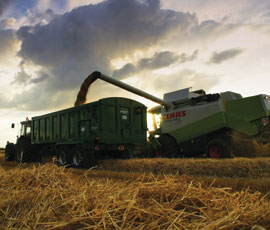Wheat and spring barley still to cut in Scotland

Harvest is becoming a torrid affair in Scotland, with almost continual rain frustrating efforts to cut remaining crops.
Inverness and Morayshire were the worst-affected areas, with at least 70% of the wheat and 40% of the spring barley crops still to cut. “The wheat has been ready for seven to 10 days, and is now sprouting in the ear,” said Simon Barry, chief executive of Highland Grain.
Progress was now well behind last year, when 95% of the barley had been harvested compared with 62% now. But spring barley quality was holding up extremely well. “It is a very good crop, and it will be a tragedy if we don’t get the rest of it cut in good nick. Yields have been very good – so it is very frustrating for growers to know there is a good crop out there that they can’t get at.”
In Perthshire, farmers were making tremendous progress against the odds, said Robin Barron, general manager at East of Scotland Farmers. “Considering we are only averaging one or two days’ combining a week, it’s remarkable how much has been done.” However, they still had a quarter of their spring barley and two-thirds of their wheat to cut.
“The drying charges are going to be high, but so far the quality of spring barley has been fine – there have only been one or two loads that haven’t made the grade for malting.” Germination levels were still at 98%, and nitrogen was averaging 1.42%, he said.
“One of the features of the season has been the late ripening of all crops, because of the lack of sunshine this summer. Farmers have managed to keep up with the crops as they ripen, which is why the quality is holding up so well.” But with 100mm of rain falling every month since April, some fields were extremely wet underfoot.
Further south, farmers in Yorkshire had virtually finished harvest, said David Padgett, managing director of Argrain. “It’s all done apart from a few spring beans. The Hagbergs in the later-cut wheat have gone, but the specific weights have been alright, and yields have been good on heavy-bodied soil.”
Lighter soils had not performed so well, but yields had probably averaged about 9.3t/ha. “There is some sprouting in the later-cut wheat, but it’s not a horrendous proportion.”
In Lincolnshire, Mark Ireland was praying for rain at Grange Farm, Sleaford. “I appreciate that some people are at the opposite end of the spectrum, but we seem to have missed the rain continually,” he said. “The sugar beet is desperate for rain and is difficult to lift because it’s so dry on our lighter soils, and we are drilling into dust.”
Potato progress
Extreme weather was also affecting the potato harvest, with conditions too dry in the Midlands and too wet for Scottish growers.
Overall, progress was about two weeks ahead of last season, with 39% of the UK crop lifted by 16 September, said Jim Davies at the Potato Council. “In England, some growers are irrigating ahead of harvesters, which in some cases are running at low speeds to minimise bruising. But in Scotland, lifting has been restricted by wet weather.”

